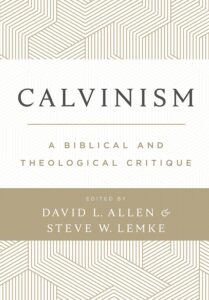
Leighton Flowers begins in his chapter, “A Critique of Unconditional Election,” published in the latest critique on Calvinism by David Allen and Steve Lemke, Calvinism: A Biblical and Theological Critique by emphasising the contrast between “the biblical choices of God which are not conditioned upon the merits of those chosen” with the Calvinist “unbiblical principle of God secret making arbitrary choices which unilaterally fixes the eternal destiny of every individual.”
A clear distinction must be drawn between the biblical choices of God, which are not conditioned upon the merits of those chosen, versus the Calvinist system, which logically entails the unbiblical principle that God secretly made arbitrary [emphasis original] choices before the foundation of the world, unilaterally fixing the eternal destiny of every individual. (CBTC 51)
Flowers concludes, I believe this doctrine, when logically and consistently applied, can be dangerous for the believer and the overall mission of the church and thus must be firmly refuted and soundly rejected as unbiblical teaching.” (CBTC 68)
Whether the Calvinist teaching of unconditional election or the Arminian teaching of conditional election is the correct reading of scripture remains a matter of debate. But Flowers’ assertion that Calvinism logically entails the principle that God makes arbitrary choices in election is a classic example of skewing the debate by arbitrarily defining the terms in one’s favor. As the adage goes, “He who defines the terms wins the debate.”
Flowers’ use of “arbitrary” in his definition effectively and unfairly stigmatizes Calvinism as theologically dubious since its logic entails a God one who is capricious, irrational, if not tyrannical. Truth be told, Flowers’ underhand tactic is an egregious distortion of Calvinism. If anything, traditionally, Calvinism has been often criticized for upholding a rigid theological “system”, and a system is anything but arbitrary, especially when Calvinism places the uncompromising sovereignty of God and the wisdom of his counsel at the centre of the theological system.
More importantly, the arbitrariness which Flowers associates with God is a non-starter. The question, “does God act arbitrarily” is sure to receive a resounding “Nein” from Calvinism and classical theism (Nicene Creed and Reformed Confessions). The Calvinist emphasis on the decrees of God is that God from eternity acts according to the counsel of his wisdom and will, to fulfil his eternal plan and purposes (Eph. 1:11). Likewise, God’s acts of salvation is entirely consistent as it fulfils his plan for salvation. Precisely, the Calvinist and classical theist understanding of the perfections of God, that is, being sovereign, omniscient and omnipotent, and all-loving, should preclude any hint of arbitrariness (that is, irrational and unjust) in his action (Psa. 145:17).
Submission to decrees of earthly kings is premised on the assumption that the king is not acting arbitrarily when he decrees according to his sovereign will. How much should be the case when the cosmic King of kings decrees? So, is God arbitrary in his action? Nein! Such a suggestion not only stigmatizes Calvinism, it borders on slurring the name of God.
Yes, submission to God is in order since mere puny, finite creatures who are not privy to God’s counsel will not understand the full wisdom of God’s decrees. More importantly, trust is in order even when His subjects are not able to fully understand or full rationalize the rhymes and reasons of the decrees of God (Rom. 11:33-36) because God has revealed his love and goodness in his plan of salvation (Deut. 29:29). Yes, for the Calvinist, arbitrariness in God must be ruled out of court. For all of Calvinism’s reputation of being an uncompromising logical system, there is room for mystery and faith for the Calvinist.
Related Post.
Calvin on Predestination (Election and Reprobation)